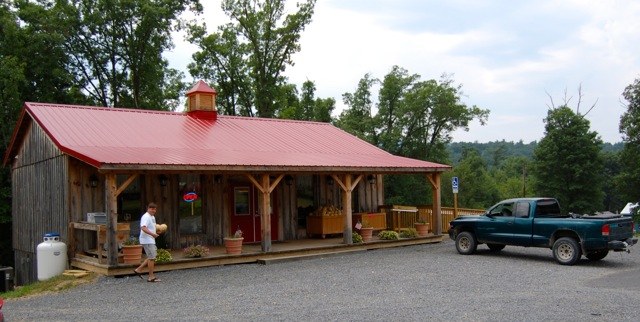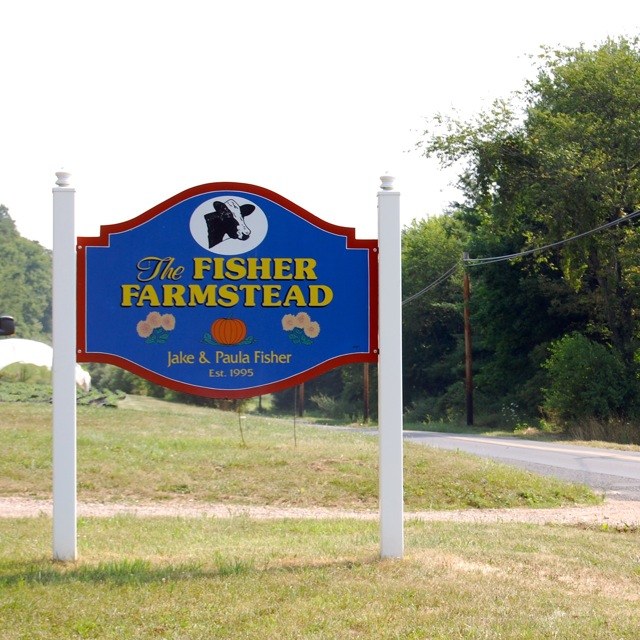WAgN’s July 2012 field day brought us to Paula and Jake Fisher’s mixed vegetable farm and nearby farm shop in Snyder County to learn about starting a retail farm market.

Farm Tour with Paula and Jake Fisher
We began the day with a farm talk and tour where Jake and Paula showed us their first farm market- a riding mower and wooden cart at the end of the driveway! Over the years they expanded from the cart, to a tent, then two tents and then to a carport. They sold from the carport successfully for many years, but without an enclosure it became increasingly difficult to get any time away from the farm. Paula says that even going out to dinner became difficult, as customers would stop by at 7am or 11pm most days of the week. Paula was always happy to serve her customers, but the dream of having a permanent retail shop was born. The shop would allow the Fisher's to sell their produce, meat and eggs in a climate controlled environment with easy access for all.
They half-jokingly told a nearby farmer who operated a farm market on a main road, that when he was ready to sell, they were ready to buy. It wasn't long before that friend came by to offer them what he called 'the money-pit.' Paula and Jake recognized the potential in the retail market shell, and together with their local community bank, they secured the financing to buy the money pit. While they didn't need a business plan, having a close relationship with their local bank was pivotal. Since the bank knew the Fishers and the property in question- they saw that the potential could be realized and were ready to make the necessary loans.
Early on, another local farmer, Grant Stufft, heard about the shop's sale to the Fishers. Grant, a full time veterinarian and self-proclaimed 'meat geek' had dreams of making local sausage and marketing meat from his farm. He got in touch with the Fisher's and a partnership was born. Paula says Grant was instrumental in helping to navigate the legalities of opening a retail food establishment with commercial kitchen. With Grant on board, the Fisher's decided to complete the commercial kitchen on the ground floor of the shop so that Grant could make meat products and Paula could invite in bakers.
The shop took over a year to complete, but is now fully licensed and inspected to process and sell farm produce and products. Opening just this past spring, the shop is already doing well and word of mouth has the customer base increasing each week. The Fishers continue to market at four local farmers markets each week and have hired some help for the shop. Eventually they would like to dial back on traveling to the markets and glean a salary from the retail shop. For now, they continue to rely on Jake's outside employment while the business grows.
Tips for navigating the commercial kitchen legalities from Grant:
- Any commercial building in PA must meet state building codes (even if your town does not have commercial building codes)
- The first step should be to call an architect or engineer to get plans drawn up, this saves a lot of hassle down the road. These plans will determine the inspection.
- Get a copy of the International Building Codes from your local library to get an idea of the language and types of requirements (Grant also suggests leaving this in sight when the inspector comes through- to show that you did your homework).
- Plumbing and electric codes are different in commercial buildings than in homes, so make friends with your service providers as it is likely you will have to make modifications at least once.
- Building codes themselves are subject to some interpretation, so be respectful and courteous to the inspector. A cooperative attitude goes a long way here.
- A commercial building will have to be handicap accessible, in their case this meant refitting the toilet three times. Patience is a necessity.
- If you don't have municipal water you'll need to get DEP approval. In the case of septic and well, about $2,400 worth of water testing proved the safety of this venues water supply.
Food Processing Safety Tips from Grant:
- Comply with ACT 106- the PA Food Code Act. For instance this law requires labeling your products for accountability (your name, address, date etc.) and having washable floors and walls in your commercial kitchen.
- If you'll be using eggs, meat or other potentially hazardous food products, you will have to write a HACCP Plan. This is like a flow chart diagramming how you will control contamination at each stage of the food processing. A chamber vacuum packer also requires a HACCP Plan.
- Check out the FDA's model food code, as this is where PA gets its food codes from.
- Check out food safety inspection reports online for your local area. This will give you an idea of what inspectors are looking for and where you may be out of compliance.

Marketing your market tips from Paula and Jake:
- Use Facebook! Even if you don't use it yourself, set up a page for your farm. Paula posted some pictures of sweet corn the day it was ready and they had 25 people into the shop that afternoon after having seen the corn pictures on Facebook.
- Don't be afraid to set a price for the quality of your product. We can't compete with discount chains on price, but local quality is always better and customers do come to know that.
- Shop your competition, get an idea of their pricing and customer service.
- Customer relations are the most important aspect- know your customer's names and what their children are doing. Direct marketing like this requires people skills.
- Network with othe r farmers to sell some of their products and fill in when you are short. Make these relationships lasting by always going to the same farms.
r farmers to sell some of their products and fill in when you are short. Make these relationships lasting by always going to the same farms.
- Make sure the shop is full of produce and looks inviting.
Pennsylvania Women's Agricultural Network
Address
302 Armsby BuildingUniversity Park, PA 16802
- Email pawagn@psu.edu
Pennsylvania Women's Agricultural Network
Address
302 Armsby BuildingUniversity Park, PA 16802
- Email pawagn@psu.edu

